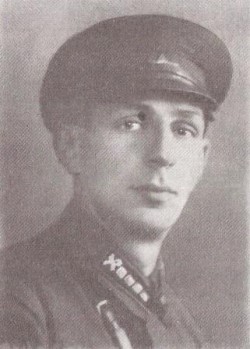David Fleitman was born in 1903 in St. Petersburg. His father, Ilia Fleitman, owned a typography business. In the early 1920s, David graduated from a technical institute with a diploma in electrical engineering, and went on to work at various enterprises in Leningrad (St. Petersburg). In September 1939, he was enlisted in the Red Army ahead of the Soviet invasion of Poland, which followed the Nazi-Soviet agreement (the so-called "Molotov-Ribbentrop Pact"). In November 1939-March 1940, he was called up for the Soviet-Finnish (Winter) War. Following the German attack on the Soviet Union, David Fleitman was drafted yet again. This time, he was assigned to the anti-aircraft artillery and sent for re-training.
"Very soon, the fascist kites will taste my lead and steel seeds",
he wrote in one of his unfailingly optimistic letters to his family. 1
In November 1941, he finished the course as a military technician 2nd rank (equivalent to a lieutenant), and was attached to the communications company of the 972nd Rifle Regiment, operating in the south, in the Russian-Ukrainian border area. In early 1942, he took part in the Red Army's counter-offensive. In May 1942, the Wehrmacht began its summer offensive, and the Soviet forces in the Kharkov-Barvenkovo area were engaged and destroyed. During this operation, in July 1942, David Fleitman was killed.
"I cannot convey to you the sense of joy that fills us when we enter our settlements, one by one; at the same time, the feeling of burning hatred toward the damned German fascists flares up more and more. We will never forgive these monsters for all the atrocities they commit when they abandon our villages and cities. … When we entered the town of Barvenkovo, I saw with my own eyes the pit into which these bastards had tossed the killed citizens. I saw an 82-year-old man who ran the distillery storehouse – the fascists killed him simply because he was Jewish; before the execution, they brought out his 55-year-old daughter, bound their hands together, and killed them both. And when the Red Army enters a village that was occupied by the Germans, that's when they run off without thinking, leaving weapons and equipment behind, throwing off their boots, tossing away the looted goods."2







